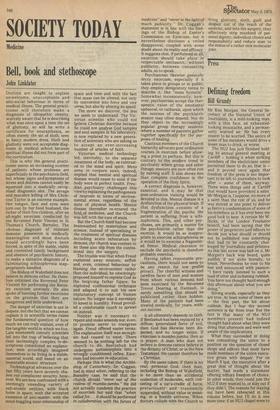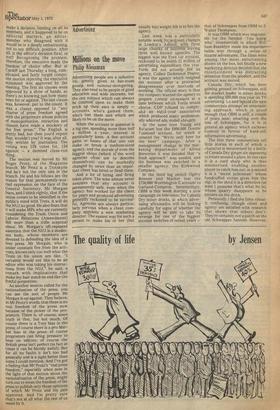Press
Defining freedom
Bill Grundy
Mr Ken Morgan, the General Secretary of the National Union of Journalists, is a mild-looking man, with a thin face, an exhaustedlooking moustache, and a permanently worried air. He has every reason to be worried. The antics of some of his members would drive a lesser man to drink, or worse.
The NUJ has just finished holding its annual general meeting at Cardiff — holding it when striking members of the electricians union permitted them to do so, that is — and it proved once again that freedom of the press is too important to be left to journalists to look after — some of them, anyway. There were things said at Cardiff that would have provoked a saint. Mr Morgan is, I suppose, no more of a saint than the rest of us, and he was moved at one point to deliver as fierce a condemnation of some of his members as it has ever been my good luck to hear. A certain Mr W. Hicks, of the London Freelance branch, had been saying that the power of proprietors and editors to decide just what should or should not be published was something that had to be constantly challenged by journalists and printers. As this last straw was laid on it, Mr Morgan's back was heard, quite audibly if not quite literally, to break. Nevertheless he rose to his feet and announced with passion: "I have rarely listened to such a load of utter and sickening rubbish. You have not thought hard enough this afternoon about what you are doing."
Strong words, especially as they are true. At least some of them are — the first part, the bit about rubbish. But I fear the second sentence is far from true. For the fact is that many of the NUJ members present had indeed thought hard about what they were doing that afternoon and were well aware of the implications.
What they succeeded in doing was committing the union to a position on the question of closed shops and editors that must have made members of the union executive groan with despair. For on March 8 last, the executive after a great deal of thought about the matter, had made a statement offering editors freedom of choice. In other words, they could join the NUJ if they wanted to, or stay out if they didn't. The reasons for staying out have been rehearsed in this column before, but do it one more time: if an NUJ chapel were to make a decision, binding on all its members, and it happened to be on editorial matters, an editormember who disagreed with it would be in a deeply embarrassing,
not to say difficult, position. After all, is the editor's decision final, or not? Recognising the problem, therefore, the executive made the freedom of choice offer. But at Cardiff last Thursday a long, complicated, and fairly turgid composite motion rejecting the executive statement was approved by the meeting. The first six clauses were approved by a show of hands, so there's no knowing just how many were for or against. The last clause was, however, put to the count. It was a clause opposed to "any Charter of press freedom agreed With the proprietors whose policies of monopolisation, retraction and Closure have made a mockery of the free press." The English is Pretty bad, but then you'd expect that, wouldn't you? It was, after all, only written by journalists. The voting was 159 votes for, 154 against — a damned close-run thing.
The motion was moved by Mr Roger Protz, of the Magazine branch. Mr Protz is a Trotskyite and he's not the only one in the branch. He and his fellows are the reason for that permanently-worried expression on the face of the General Secretary. Mr Morgan fears, and I think rightly, that if the union comes to be identified in the Public's mind with Trots, it will do the NUJ no good. He also fears that it will make MPs who are currently considering the Trade Union and Labour Relations (Amendment) Bill more than a trifle sceptical about Mr Morgan's oft-repeated assertion that the NUJ is a moderate body, whose members are devoted to defending the idea of a free press. Mr Moran, who is under constant fire from the activists, knows only too well what the Trots in his union are like. "I certainly would not like to be an editor who was taking his instructions from the NUJ," he said, a remark with implications that make my hair stand on end like the fretful porpen tine.
As another motion called for the nationalisation of the press, you can see the sort of people Mr Morgan is up against. They believe, in Mr Protz's words, that there is no real freedom of the press now because of the power of the proprietors. There is, of course, some truth in that, but not much. Of course there is a Tory bias in the press; of course there is a pro-Market bias in the press; of course proprietors can bring pressure to bear on editors; of course the British press isn't perfect (in fact at times it can be bloody awful). But for all its faults it isn't too bad generally and is a sight better than some I could mention. And I've got a feeling that Mr Protz's "real press freedom," especially when seen in the light of that motion about the nationalisation of the press, might turn out to mean the freedom of the press to publish only those opinions of which Mr Protz and his pals approved. And I'm pretty sure that's not at all what the rest of us mean by it.



































 Previous page
Previous page